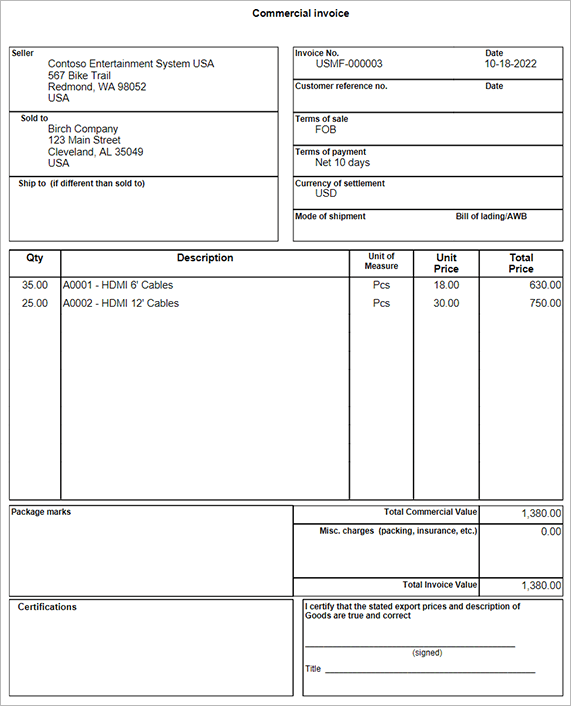Proper documentation is required while shipping goods from one country to another in the present global trading world. Such shipping requires proper documents for easy and smooth processing without any regulatory non-compliance or financial record problems. Amongst all these required documents, commercial invoice is prominent and plays an important role in such shipments. It acts as both a contractual document and a financial record for buyers, sellers, and customs authorities.
This blog will cover all aspects of a commercial invoice. It will start with a brief introduction of a commercial invoice, supported by its importance. This will be followed by key components of a commercial invoice, which will help you in understanding a commercial invoice in detail. This blog will also contain common mistakes which occur while creating commercial invoices, and strategies to avoid them. Whether you’re a seasoned business owner or new to international trade, understanding this document is essential to your success.
What Is a Commercial Invoice?
A commercial invoice is a paper that details a sale transaction in international trade, from a seller to a buyer. It will provide proof of the sale transaction and contain most of the relevant information about the shipment. This document is more than a packing list or a proforma invoice as it is binding by law, and it forms a significant part of what customs use to calculate their duties and taxes.
The purpose of this document is transparency over cross-border transactions. This also means that both parties- buyer and the seller-reach a common agreement in relation to terms and conditions to prevent any misunderstandings and disagreement.
Why is the Commercial Invoice Important?
1. Clearance of Customs
The commercial invoice is used to determine the correct value of goods, classify the goods correctly, and calculate all duties and taxes applicable. This document can sometimes cause shipments to be delayed or even confiscated in case it is missing.
2. Business Accounting
Businesses require a document which can serve as a source of record for them. Commercial invoice serves that purpose, it keeps record of sales, helps in account reconciliation and audits.
3. Legal Requirement
Most countries demand a commercial invoice for imported and exported goods. It ensures the observance of trade laws that protects businesses from legal complications.
4. Payment Facilitation
Buyers and sellers use the commercial invoice to settle payments. The commercial invoice will serve as a reference in terms agreed to ensure smooth financial transactions.
Key Components of a Commercial Invoice
To be effective and compliant, a commercial invoice must include specific information. Here are the key components:
1. Seller and Buyer Information
The commercial invoice shall include the correct legal names and addresses of the parties involved, and their contact information. This serves to identify parties in the transactions. For a seller, that would be their company’s full name, physical address, phone number, and email address, while for a buyer, he or she has to provide adequate information to the seller to help avoid confusion at the time of delivery.
This information not only benefits the parties involved in the transaction but also the custom authorities and banks. Furthermore, it keeps proper communication even when there arises any query about shipping or about the payment transaction.
2. Invoice Number and Date
A unique invoice number and the date of issue should be mentioned for record-keeping purposes. The invoice number will serve as a reference number for both parties, the buyer and the seller, and thus ease the communication and dispute arising in the case. The numbering scheme should be continuous and easy to follow so as to help sort out financial records.
The date of issuance further helps establish a timeline regarding when the transaction happened, which becomes extremely important in observing payment schedules that were stipulated by one another. Custom requires an invoice to demonstrate an intention to satisfy relevant import-export rules.
3. Description of Goods
This would include giving the most comprehensive details about the shipped goods, like their name, quantity, unit price, total value, and the HS code. The HS code is particularly significant because it will define the amount of duties and taxes that need to be paid based on its customs classification.
This allows customs officers to process shipments more quickly and with less chance of delay or fine incidence as a result of discrepancy. For organizations, detailed and proper descriptions also help clarify transactions so that items are less likely to be disputed as to nature or quality.
4. Terms of Sale
In most cases, it describes the sale’s terms under the title “Incoterms.” It represents a policy relating to costs and risks as they affect both buyers and sellers when the products move. For example, FOB stands for free on board while CIF means Cost, Insurance, and Freight. CIF incurs more expenses as the cost of transportation and insurance.
Properly including clear and accurate Incoterms in the commercial invoice can avoid misunderstandings. These are standardized terms known worldwide, meaning that both parties will understand what is expected of them. Customs authorities will also use them to establish the value of the goods for tax purposes.
5. Currency
The commercial invoice must state the currency in which the transaction is conducted, such as USD, EUR, or GBP. This is critical for financial clarity and ensures that both parties are on the same page regarding the value of the transaction.
Indicating the currency also simplifies payment processing, as banks and financial institutions require this information to complete transactions. For international trade, specifying the currency can prevent disputes caused by exchange rate fluctuations or misinterpretations.
6. Country of Origin
It is an identification of which country manufactured the product. This often influences the available trade agreements of that country regarding applicable tariffs and duties at ports of departure or entry of customs. Some states have preferential agreements that charge fewer tariffs from goods originating within such countries.
It is important to include the country of origin on a commercial invoice, to meet the requirements under international trade.. It also helps businesses take advantage of any applicable benefits, such as reduced tariffs under free trade agreements.
7. Shipping Information
Shipping information will include the method of transport-whether by air, sea, or land-as well as the carrier’s name and date of shipping. Such information provides a synopsis of the method of transport and the date of the shipment, therefore aiding in the planning of logistics.
Customs also need shipping information for monitoring goods movement and for verification of import-export compliance. Good shipping information ensures proper preparation of buyers in receiving their shipment and an incident-free delivery process.
8. Signatures
Without a signature from an authorized representative of the seller, the commercial invoice is considered invalid. It is a declaration that the information on the invoice is correct and that the seller agrees to the terms and conditions stipulated in the document.
It makes the business legitimate and accountable in the eyes of the buyer and customs authorities, which is why it is essential to have a signed commercial invoice.
Common Mistakes to Avoid
To ensure the success of your commercial invoice, do not commit the following errors:
1. Inadequate Descriptions – Vague or incomplete product descriptions can result in customs delays or rejections.
2. Non-inclusion of critical details – Missing information, such as the HS code or country of origin, can complicate customs clearance.
3. Incorrect Use of Incoterms – Always ensure you understand and apply the Incoterms correctly to define the responsibilities.
4. Currency Miscommunication – Always confirm the transaction’s currency to avoid payment disputes.
Guidelines to Using Commercial Invoices Effectively
1. Standardize Your Process – You can standardize your process by creating a template for all transactions. This step will ensure uniformity amongst the invoices. Also there will be less chance of errors, and increased efficiency when using templates.
2. Use Technology – Create, process, and store commercial invoices using electronic invoice creation tools. This generally operates with integration into the primary accounting packages to facilitate easier record-keeping.
3. Train Your Team – Train your staff on how to create and use commercial invoices properly. Regular training reduces errors and enhances efficiency.
4. Keep Up with Regulations – Whether be local trade or international trade, rules and regulations continuously change to make trading more secure and fruitful. You should be informed with updated policies, to stay on top.
Sample Invoice

Conclusion
A commercial invoice is an important document in international trade. It is one of the major backbone documents used in smooth transactions and regulatory compliance. Its importance cannot be overlooked, as its use directly influences customs clearance, financial record-keeping, and buyer-seller relations.
Understanding what comprises, and what a commercial invoice is, means that you are capable of generating compliant, error-free documents in your quest to handle your business properly. Applying the best practice techniques along with innovative tools would also ensure a process streamlined towards a greater benefit-to-time effort. Matters like new business growth will also gain priority for attention.
This blog is suited for all kinds of business owners, whether they be small business owners, or large global players. We hope that now, you know about commercial invoice in detail, and can successfully utilize it to increase your trade.
Simplify and revolutionize your invoicing process with BriskPe! Our all-in-one online platform enables easy creation, sending, and receiving of money, taking care of all specific business needs.
Be it freelancing, owning a small business, or running an enterprise, BriskPe is made for you; it automates your financial operations. Don’t let invoicing get in your way; power your business with tools that actually work for, not against, you.









